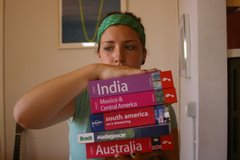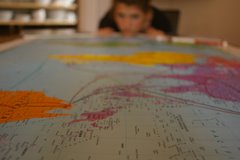
Vaig deixar passar uns dies per escriure sobre Cuba; primer perque encara hi havia els Morell allà i també per digerir un xic l'experiència. Ara ja fa dies que hi penso i vull explicar què em va semblar l'illa i la nostra visita.
Arribar a l'Havana va ser molt agradable, el taxi ens va portar fent un passeig cap a la casa particular on ens haviem d'allotjar, ens anava explicant què era cada fàbrica i com de bé anaven les coses amb en Fidel, ja fa més de 40 anys. Al arribar a la casa ens va cobrar tres vegades el que marcava el taximetre i quan li varem preguntar com era, va fer un silenci total. No hi havia discussió!
La casa on varem estar les primeres dues nits pertanyia a una familia d'origen Gallec que eren molt adeptes al règim. Un fins havia estat part del consell d'estat en algun moment. Varem tenir una llarga xerrada de política mundial i finalment, ja ben tard, vaig aconseguir parlar de política Cubana. Tot era una meravella, i els EEUU un dimòni mentider, sengons ells la història no és exactament com l'entenem els europeus, fins a un punt un xic surrealista.
Ja fora de la ciutat, visitant parts més o menys turístiques, sovint et semblava que eres una font d'ingressos i prou... els preus anaven creixent a mida que passava l'estona, qui era amable acabava demanant més diners dels acordats o sugerits en primer lloc; de sobte les normes per a les cases particulars canviaven i ens calia agafar una habitació extra per les noies, ja que ens deien a partir dels 15 anys es consideraven com adults i no es podia compartir cambra... Ens insistien en menjar a les cases però el que ens donaven era de molt poca qualitat i sempre el mateix: quants cops es pot menjar pollastre sec en pocs dies? De sobte et trobaves recollint un autoestopista (jinetero) a 80 km de la propera ciutat i sense saber com, acavaba portant-te a casa d'una sogra que no ho era, que ni el coneixia, i et llogava una habitació que no tenia res a veure amb la descripció que t'havia fet. Quan demanaves explicacions o questionaves alguna cosa, tornava el silenci que saben fer els Cubans. Mutis, cap resposta o com a molt canvi de tema. Mai s'embrancaven en una discussió.
Ens va semblar que volent sortir de les rutes "normals" es fa molt difícil viatjar, i que quan et penses que ho has aconseguit, un altre cop, t'estant fent servir, d'una manera o altra.
Els serveis i les infraestructures son molt bàsics si no estan deixats dels tot, però els Cubans - els que parlen- ho defensen i en donen la culpa a l'embargament. Sorpren que els més abandonats, son els que més ho defensen tot... Una vegada una noia que vivia sense electricitat i havia de traslladar-se més d'una hora sense transport públic, deia que tot anava bé... encara que potser desconeixia que a l'Havana i a les altres ciutats si n'hi havia d'electricitat i de transport públic, enacara que basic.
El país és molt interessant, però decepciona que tothom hi visqui a base d'"arreglos" i que han creat una societat de classes més extrema que en molts països capitalistes.
Els militars tenen més drets que ningú i condueixen cotxes en condicions, mentre que l'altra gent ha d'esperar una guagua que els portarà amuntegats a treballar, si es que tenen feina. Els que tenere "remesa" de familiars a Florida o en altres parts del món, poden comprar en CUCs i viure com a classe mitjana, i els que no tenen a ningú han de "buscar-se la vida" com poden.
Hi ha joves que no formen families perquè no volen que els seus fills visquin això, i com que no poden marxar es deprimeixen esperant una oportunitat d'escapar; encara que saben que no és la solució i que el que realment voldrien és un canvi per quedarse a la seva illa.
De tornada a l'Havana, abans de marxar, varem acabar en una casa particular d'una familia que havia estat rica però ara no ho era; els guardava la casa un noi i varem passar una nit desperts en una casa gegant, fantasmagòrica, amb matalassos de més de 40 anys i sense roba de llit, preocupats per si venia una inspecció ja que no havien fet els papers -i per tant era un lloguer il.legal-, o per si entrava algú altre. Pel matí varem marxar, deixant una propina però no pagant per la nit, ja que no era raonable... varem buscar un altre habitació per la darrera nit i varem trobar-ne a casa una dona extraordinària, un xic gran, que havia estat part de la revolució. Vivia aturada en el temps, parlant dels camarades com si fossin els anys 60 i de com ballaven amb les botes posades. Ens va acollir molt bé, varem conversar molt i fins ens va fer algun obsèqui i tot. Aquella nit varem dormir molt bé, encara que com que l'avió marxava aviat, a les 4 del matí ja preniem un cafè de despedida.
Per cert, la darrera nit varem anar al Copelia, la famosa geladeria simbol dels resultats de la revolució, creada als anys 60, , on els cubans encara fan llargues cues per menjar els seus gelats, encara per nosaltres, com a estrangers, no n'hi havia de cues. Varem disfrutar d'una plata de gelat per persona, entre molts cubans que també en menjaven; això si, aquell dia, tocava xocolata, i tots haviem de menjar el que tocava: cinc boles de gelat de xocolata per plata, centenars de persones menjant a la vegada plates amb cinc boles de gelat de xocolata!
I’ve waited some time to write about Cuba, firstly because the Morells were still there and secondly because I needed to digest the experience. I’ve been thinking about it for days and would like to explain what I thought about the island and our visit.
Our arrival in Havana was most pleasant. A taxi took us to the private house we were staying in and as we drove there the driver pointed out every factory and told us how well things were going after 40 years of Fidel.
When we arrived at the house, he charged us three times the amount on the meter and when we asked why, our question was met with silence. The house we stayed in for the first two nights was owned by a family of Galician origin who were very supportive of the system. One of them had been part of the ruling party at one time. I had a long chat with him about world politics and eventually, by this time it was late, about Cuban politics. According to him, everything is marvellous and the USA is a lying demon and that history is not exactly as Europeans have been led to believe it to be: all a little bit surreal.
Once we’d left the city visiting more or less tourist sights we came to feel we were only walking cash machines … prices rose as we were chatting to people..... friendliness always turned into asking for more money than originally agreed… all of a sudden the rules governing private houses changed as we were told anybody over 15 was considered an adult and so the girls couldn’t share a room with us ..... they insisted on us eating in but the food was always of a very poor quality and always the same .... how often can you eat dry chicken? ....more than once, having picked up a hitch-hiker, sometimes 80km from our destination, the hitcher (jinetero) would take us to a non-existent ‘mother-in-law’s’ house where they would offer very different services to the ones he’s promised e.g. smaller/fewer rooms or no bath. When we asked for an explanation or questioned something, we were met with a silence that all Cubans seemed able to create when necessary. Mute. No reply or they changed the subject, an art they have all mastered. They never engaged in any kind of real debate.
We wanted to avoid the more touristy routes, but travelling that way proved difficult and once we thought we’d mastered it we had a feeling we were being used again in one way or another. Services and infrastructures are really basic, if not totally abandoned. However, the few Cubans who were willing to talk about this claimed things were alright or that it was the fault of the embargo. Surprisingly, those with fewer services and little state support were the most defensive of the system. One of our hitchers, a young woman who lived in the north without electricity and who had to regularly travel for more than one hour without any public transport kept claiming that everything was going well.....unknowingly, perhaps, that Havana and other cities have had electricity for a long time and also a very basic public transport system.
The country is very interesting but it is disappointing that everyone has to live by breaking the rules and that they have created a class society, at times more extreme than in some capitalist countries. The military have more rights and drive better cars than anybody else, meanwhile most people have to wait for a ‘guagua’ (bus) to get to work packed in like sardines, if they’re lucky enough to have a job. Those that receive money from their relatives in Florida or anywhere else, can purchase in CUCs and live a middle-class lifestyle, whilst those without this outside support have to struggle to survive.
There are young people who are not starting families because they do not want their children to live this life, and because they cannot leave the island they get depressed waiting for an opportunity to escape, although they are very aware that that is not the best solution for their country and what they would really like to see is a change so they could have a better life in Cuba.
Before leaving, we returned to Havana and ended up staying in what was once a rich family’s home, now empty and looked after by a young man (guard). We were awake all night in this enormous, seemingly haunted house, lying on at least 40-year-old mattresses without any bedding, worrying if an inspector – this was an illegal stay, as they hadn’t declared it – or anyone else would come in. Early the next day, we left leaving a tip but of course not paying the full rate, as it was totally unacceptable – think Miss Haversham! We looked for another room for our last night and found one in an extraordinary woman’s flat. If only we’d found her on our arrival! Getting on now, she had lived the revolution and was still living in those times. She talked about her comrades, dancing in her combat boots, chatted a lot to us and even gave us a gift. That night we slept really well, although not for long as our plane was leaving very early in the morning, so at 4 in the morning we were having a coffee with her.
By the way, on our last night in Havana, we went to Copelia, the famous ice-cream palour opened in the 60s and a symbol of the revolution’s achievements, where Cubans still queue round the block to enjoy their ice-cream, although, as foreigners, we didn’t have to queue. We enjoyed a large ice-cream ‘ensalada’ along with all the other local customers; this comprised of chocolate ice-cream with chocolate ice-cream – 5 scoops of chocolate ice-cream, the only flavour available. Very nice if you really like chocolate ...







